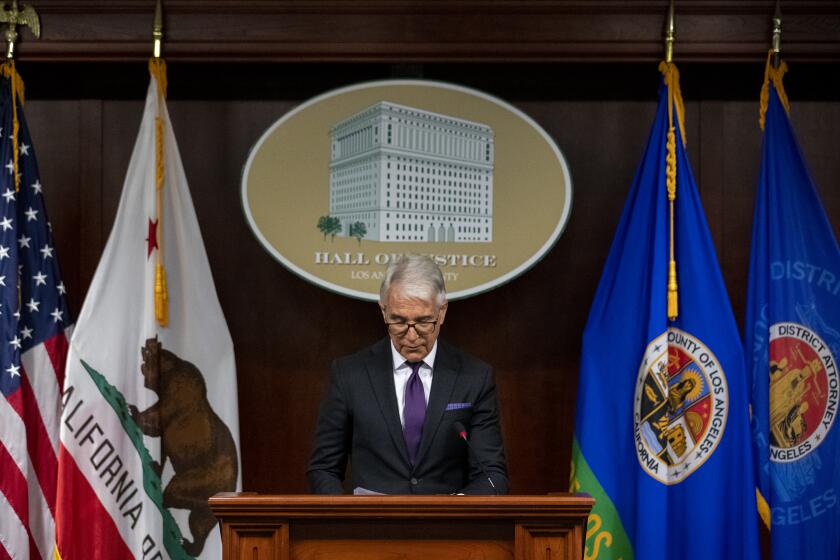Gascón advisor facing felony charges argues case is misunderstanding over public records

- Share via
A top official from the Los Angeles County district attorney’s office is asking a judge to toss out 11 felony charges filed against her by state prosecutors, with her attorney arguing in a court filing that the allegedly confidential files she’s accused of misusing were actually public records.
In April, California Atty. Gen. Rob Bonta accused Diana Teran, then a top advisor to Dist. Atty. George Gascón, of illegally using confidential records about 11 sheriff’s deputies when she flagged their names for inclusion in a database used by prosecutors to keep track of officers accused of misconduct.
Within hours of Bonta’s public announcement, Teran’s attorney, James Spertus, said that his client had done nothing wrong and that the records in question were likely all public in existing court filings.
The state prosecution of one of the L.A. County D.A.’s top lieutenants has ignited another round of criticism of the embattled progressive, but some legal scholars have questioned the validity of the charges.
But because state prosecutors asked to keep the deputies’ names secret, for two months Spertus couldn’t prove it. Then last week, a Los Angeles County Superior Court judge unsealed a key document, including an unredacted version for the defense filed under seal.
The public version of the document — an affidavit used to justify the charges against Teran — revealed the names of two deputies, both of whom had disciplinary histories easily found through a Google search. According to Spertus’ latest court filing, the unredacted version revealed that records relating to the nine other deputies were already public as well.
“From the moment this case was filed, I was suspicious of what the motive [for filing it] was because there’s no crime and release of the affidavit confirms that,” Spertus told The Times late Monday. “The underlying theory is that she stole public information.”
The California Department of Justice did not respond to a request for comment.
Teran had been scheduled to enter a plea Monday morning. But the judge rescheduled after state prosecutors said they needed time to respond to Spertus’ filing.
Much of the brief hearing focused instead on the hundreds of pages of attachments Spertus filed, which he said were all publicly available court records. State prosecutors questioned whether Spertus was allowed to file them publicly based on his knowledge of the nine redacted names.
Prosecutors did not address the substance of Spertus’ filing but accused him in court of making an end run around a protective order. The judge decided to leave those attachments sealed for the time being.
The allegations at the center of the case date to at least 2018, when Teran worked at the Los Angeles County Sheriff’s Department as a constitutional police advisor. Part of her usual duties there included accessing confidential deputy records and internal affairs investigations. The department’s secret tracking software logged all of her searches and kept records of the more than 1,600 personnel files she searched for and reviewed, according to the affidavit unsealed last week.
Teran served as assistant district attorney over ethics and integrity operations. A spokesperson for the district attorney’s office previously said in a statement that Teran was no longer in that role, with no further clarification offered.
L.A. County Sheriff’s Department denies retaliating against Men’s Central Jail inmates after oversight report on fires.
After she joined the office in 2021, the affidavit says, Teran sent a list of 33 names and supporting documents to another prosecutor for possible inclusion in a so-called Brady database, which contains officers with problematic disciplinary histories. The name is a reference to a landmark 1963 U.S. Supreme Court decision that requires prosecutors to turn over any evidence favorable to a defendant, including evidence of police misconduct.
The affidavit says that several of the names Teran emailed to fellow prosecutor Pamela Revel were deputies whose files she’d accessed while working at the Sheriff’s Department, and that she “would not have identified so many of these deputy sheriffs” otherwise.
The 11 felony charges reflected the 11 of those 33 deputies whose names the affidavit said did “not appear in either public records request responses or media articles.”
But, as first reported by the Los Angeles Public Press, the two names left unredacted last week in the public version of the affidavit were those of deputies whose disciplinary records were already openly accessible through other means. After they appealed their firings for dishonesty in the early 2010s, their disciplinary histories were discussed in detail in publicly available court decisions a few years later.
After finally learning the remaining nine names on Thursday, Spertus argued in this week’s filing that all of the deputies had similarly accessible records.
“The Attorney General’s entire theory of guilt is dependent on the allegation that Ms. Teran attached non-public documents to her April 26, 2021, email, yet the affiant apparently never looked in the Los Angeles Superior Court files for the documents it alleges now were non-public,” Spertus wrote. “Each of the 11 documents underlying the 11 counts in the Complaint is a document that is public and located in Los Angeles Superior Court case files.”
Two months after state prosecutors announced 11 felony charges, a newly unsealed court record offers a window into the case against a George Gascón advisor.
The Sheriff’s Department doesn’t “own” public court records, he argued, just because they are kept in Sheriff’s Department files.
“Ms. Teran would not need permission from the LASD to use a public record contained in the LASD databases, and she can use those public records for any purpose,” Spertus wrote. “Simply stated, the ‘use’ of public information cannot be a crime.”
In his 40-page filing, Spertus also raised concerns about whether the case — stemming from material accessed in 2018 — had already exceeded the three-year statute of limitations for the charges.
Teran is expected to return to court on July 17, though her lawyer voiced frustration at the delay.
“It’s been a struggle to figure out what this case is about from the moment it was filed,” he said, “and as soon as I can get this heard I expect it’ll be dismissed.”
More to Read
Sign up for Essential California
The most important California stories and recommendations in your inbox every morning.
You may occasionally receive promotional content from the Los Angeles Times.














